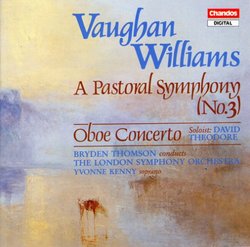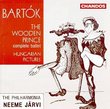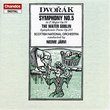| All Artists: Ralph Vaughan Williams, Bryden Thomson, Yvonne Kenny, David Theodore, The London Symphony Orchestra Title: Ralph Vaughan Williams: A Pastoral Symphony (Symphony No. 3) / Oboe Concerto - Bryden Thomson Members Wishing: 0 Total Copies: 0 Label: Chandos Release Date: 10/28/1992 Genre: Classical Styles: Forms & Genres, Concertos, Historical Periods, Modern, 20th, & 21st Century, Instruments, Reeds & Winds, Symphonies Number of Discs: 1 SwapaCD Credits: 1 UPCs: 095115859421, 5014682859424 |
Search - Ralph Vaughan Williams, Bryden Thomson, Yvonne Kenny :: Ralph Vaughan Williams: A Pastoral Symphony (Symphony No. 3) / Oboe Concerto - Bryden Thomson
 | Ralph Vaughan Williams, Bryden Thomson, Yvonne Kenny Ralph Vaughan Williams: A Pastoral Symphony (Symphony No. 3) / Oboe Concerto - Bryden Thomson Genre: Classical
|
Larger Image |
CD DetailsSimilar CDs |
CD ReviewsOne of the great symphonies. 02/15/2003 (4 out of 5 stars) "As part of the excellent symphonic cycle by Thomson, the ethereal Pastoral Symphony -the third- is indicative of the pluses and minuses that can shape and even definite the wholeness of a composition. It is, decidedly, the sum of details that can make a difference as far as interpretation goes. In the case of the third symphony, in regards to performance versus integrity, no compromises are possible. Failure to follow the "indications" would probably result in a failure to express faithfully the profound meaning of a work of such stature. We must situate the composition in its proper context. It is a quite moving piece of music, "complex but not complicated," possessing a noble resonance. The seemingly modest score shouldn't lead one to assume it is merely "light music" or sort of small-scale symphonic work. To the contrary, the Pastoral demands a relatively huge orchestra in order to produce those impressions of tension and contained power ; parts of musical elements, though "half-hidden," are moving inexorably underneath. Thus, below the surface slumbers a massive amount of music, reminiscent perhaps to a volcano. The composer succeeds in building an orchestral work apparently made of contradictory elements (at least in appearance) : The quiet temperament versus the worried passages, and the luminous tones against the somewhat somber orchestral recitatives, are good examples. Here, the composer's skill at writing a symphonic work is prominent. There's a solid foundation to that music. The symphony got its first public performance, directed by Sir Adrian Boult, at the Queen's Hall in 1922. Perhaps i should quote a note from a webpage of the RVW Society : "The symphony was conceived while VW was on military service in Northern France and reflects his yearning for home. The spectacular sunsets over the killing fields were ironic images which inspired him." This work is no simplistic pastoral sketch or scenery, although the word "impressionism" fits subjectively with the tone of the work ; it is much more an expression "inspired by landscape, but not English landscape, rather, the landscape of wartime France. Michael Kennedy sees it as a pantheistic requiem for the dead of World War I." I'd like to underline the differences between the third symphony and the fifth : Albeit they share some qualities---in character, for instance---the third and fifth have marked differences in their inward perspectives. The 'Pilgrim' quotes of the Fifth are unlikely comparable to the wartime memories of the Pastoral, separated one from another by two decades and by the anger of the Fourth Symphony. That doesn't mean you won't find any common ground, but each of the nine symphonies has individual attributes and a proper context which make all of them so unique. Conductor Bryden Thomson's version of the work is a very good one ; the LSO is in good form, helped by a crisp and clear sound as is often the case with Chandos. To quote another reviewer's words : "The benchmarks against which new recorded performances must compete are the recordings by Sir Adrian Boult, who set down the Sixth as early as 1949 and made the first recording of the Pastoral." Thomson's reading fares rather well when compared to most others (Hickox, Bakels, Previn, etc.). His tempi are fervent and well gauged. The orchestral parts exhibit colors and fine textures. Listening to most versions on cd, i end up with Adrian Boult and Vernon Handley as best interpreters, overall (i also like Norrington ; his recording of the Third, like his Fifth, is a beautiful one). The real test, i suppose, is the third movement (moderato pesante), a kind of "do or die" if you will. I've heard no better than Boult (New Philharmonia Orchestra, EMI) in this sublime movement. On the one hand, it must resound with dignity, while, on the other hand, it must retain a sort of rustic utterance (the "dance tune" parts are a prime example of this). In Sir Adrian's hands, we can experience all of this---and even more. Indeed, his EMI recording deserves to be ranked as "the best", besides his similarly great document with the BBC, from 1966 (IMP Classics / BBC CD 91642). His EMI reading is a commanding account, overall, where the elegiac tone of the symphony resounds splendidly and where the fourth movement seems vaguely nostalgic and takes on, with a little nuance, the character of a requiem. Boult with the LPO (on Decca) is yet another excellent account, offering a somewhat different perspective. As a reviewer, Leonard Nowitz, remarked : "The Decca performances are overall much darker than the EMI---not from any lack of high-frequency information (if anything, quite the reverse is true), but in mood. Contrasts between despair and hope are greater. [...] Compared to the Decca monos, the EMI stereo performances convey a Pastoral [which is] more comforting, less alien." In Thomson i can also detect some of the recurrent characteristics found in the Boult versions. Typically, Thomson succeeds in his very own approach. The first movement is attractive ; smooth but still sombre, its preludian attitude has autumnal qualities. The second movement is the most progressive (for lack of a better term), equally sombre but where colors and light seem to intensify. This is EXACTLY what you hear under Thomson (a bit less than Boult, perhaps, but more distinctly than Handley). This movement contains a plaintive motif for the trumpet, bringing to mind a bugler the composer has heard during his sojourn in France (World War I). The third movement is awesome. It starts suddenly with a kind of tune reminiscent to some of the composer's folk-based material. This theme belongs to the most dignified music ever penned by an Englishman. Here i think Boult "gets it" as no other. The profuse power decreases toward the end of the movement ; a more reflective atmosphere unveils as we expect the entrance of the final movement. A wordless soprano chant, technically reminiscent to what VW did in the last movement of his Antartica, sounds like an echo or some lament in the wind. Loneliness resounds, immense, with the glimpses and shadows of a long lost "past". This otherworldly finale finds its way through a nice melody, akin to some excerpts of the London Symphony. Maybe, this is where the Pastoral (or the composer) truly finds peace of mind. Tension drops, just the way it did in the memorable Passacaglia of the Fifth Symphony. The movement contains sublime music. The melody cleverly re-emerges near the end of the movement, like the tide, not long before the desolate wordless chant evaporates in the air, like the fog. The Oboe Concerto is another thrilling piece of "pastoral" music, it provides a nice coupling.****" Enriching David Saemann | 11/30/2008 (5 out of 5 stars) "I am a big fan of Bryden Thomson and never have been overly critical of any of his recordings. So, buyer beware! This is a masterly version of the Pastoral. The earlier LSO recording with Previn features better wind playing from the soloists, but the playing on Thomson's version still is evocative. The big tune in the third movement seems to well up from the orchestra, a classic example of the spirit of Vaughan Williams. The last movement is heart rending, with the most beautiful singing from Yvonne Kenny, even better than Heather Harper on the Previn Disc. The sound engineering is very good, offering clear textures and a flattering picture of the full orchestra. David Theodore gives an excellent, subtly nuanced performance of the Oboe Concerto. Thomson's accompaniment is especially accomplished, with great rhythmic verve. All in all, this disc is a splendid Vaughan Williams experience. It conveys the stature of the Pastoral to a rare degree."
|

 Track Listings (7) - Disc #1
Track Listings (7) - Disc #1
